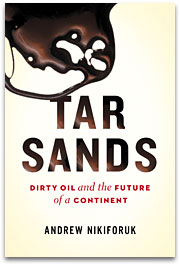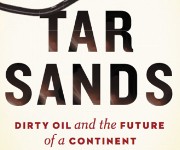 Canadian journalist Andrew Nikiforuk won the top prize from the Society of Environmental Journalists’ annual reporting awards for his investigation of oil extraction in the tar sands of northern Alberta.
Canadian journalist Andrew Nikiforuk won the top prize from the Society of Environmental Journalists’ annual reporting awards for his investigation of oil extraction in the tar sands of northern Alberta.
Nikiforuk’s book — Tar Sands: Dirty Oil and the Future of a Continent — examines the high social and environmental costs of the process of converting bitumen to refinable oil, which has drawn $150 billion in investment from the world’s largest oil companies. SEJ awarded Nikiforuk the Rachel Carson Environment Book Award, which comes with $10,000.
Grist reviewed the book and interviewed Nikiforuk when it was released; he told us:
What Americans haven’t realized yet is that the more locally they produce their own energy, the more money will circulate in local economies. Less money spent on oil, whether it’s dirty Canadian oil or bloody Middle Eastern oil, means more money staying at home, enriching American communities … So the tar sands present a real opportunity for Americans to ask some hard questions about the future: bloody oil, dirty oil or renewables? By switching to dirty oil, you’re just putting things off.
He said the economic downturn and drop in oil prices have slowed the pace of tar sands development, though they’re still generating attention. A pair of new studies attempt some tar sands greenwashery, and the activist group Action Factory held an oily demonstration in Washington on Friday to urge Secretary of State Hillary Clinton to nix a pipeline linking tar sands oil to U.S. refineries.
More notable winners from SEJ’s awards:
- A Warming Sea: Subtle Changes Can Have Profound Impacts, Los Angeles Times: Kenneth R. Weiss
- Alaska’s Changing Climate, Fairbanks Daily News-Miner: Stefan Milkowski, John Wagner
- Smoke and Mirrors: The Subversion of the EPA The Philadelphia Inquirer: John Shiffman, John Sullivan, Tom Avril [Useful to Grist in reporting our history of EPA leadership last December]
- The Hidden Costs of Clean Coal, The Center for Public Integrity: Kristen Lombardi, Steven Sunshine, Sarah Laskow, David Donald
- Is Natural Gas Drilling Endangering U.S. Water Supplies?, ProPublica: Abrahm Lustgarten,
- Burning the Future: Coal in America, David Novack, Richard Hankin, Samuel Henriques, Scott Shelley, Sundance Channel/The Green



